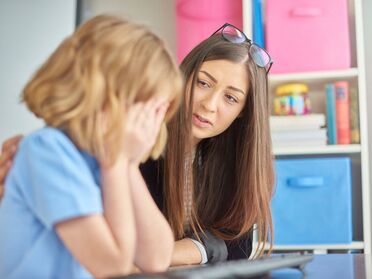 By Lindsay Gottlieb The COVID-19 virus and the various measures instituted because of it have made 2020 a difficult year for most people, especially those in school. Teachers, with little warning, are forced to figure out a way to teach their class virtually— something rarely even considered until the Coronavirus pandemic. But students, especially children, are often overlooked during this nearly impossible time. As it is, pandemic or no pandemic, children are sometimes forced to strive to be at the top of their class, which is an unnecessary stressor on its own. But to compete with other children for this title virtually, with little to no social interaction to keep them motivated? That type of pressure on a child is without a doubt unhealthy, taking most of its toll on the child’s mental/emotional health. I know one kindergartener who cries when she is unable to comprehend the complexity of online school. To physically be in school during the elementary years is a significant contributor to brain development. For example, children need to learn behavioral mannerisms: how to interact nicely with each other and their teacher and to learn problem-solving skills when things do not go as planned. Children need interactive lessons: connectors and building blocks for math, small group readings, the ability to go up and write their answer on the board, and many other aspects of tactile learning that are important for mannerly behavior in the future. Kids of these ages, specifically ten and younger need each other. It is important for students to be in an environment with a diverse group of kids of the same age to learn what types of people and personalities they get along with, and how to problem solve when there is someone they do not get along with. When there is a classroom of five kids, with desks spread apart no less than six feet, these types of interactions are impossible. I volunteer at my synagogue because I excel in working with children. This synagogue functions as a school on Sundays and Wednesdays. I come to Hebrew School on Sundays as an assistant teacher— for half an hour, I work with the older kids and teach them how to read and write basic Hebrew. I spend the remainder of my time, an hour, in a classroom with first grade students. The only thing that could make me happier there is if the pandemic was not here, and social distancing/masks were not a thing. Since that was my experience in Hebrew School as a young child, I believe every kid has the right to an in-person, interactive educational experience. These seven-year-olds wear face masks and are distanced from each other to protect themselves and their families from contracting a virus that should have been handled long ago. I asked a friend who has a brother in kindergarten to get the student's opinion about this method of learning. Perhaps unsurprisingly, he feels better in the classroom and likes to be in school because he considers it fun. I have drawn the conclusion from this mini interview as well as my own experience with kids that most, if not all kids, feel negatively toward hybrid and virtual schooling. While grades might be up with the high volume of students learning from home, this means nothing regarding performance levels. It is without a doubt that students use their advantage of being home to look up answers on tests. It is difficult enough for neurodivergent students such as myself and those who struggle with ADHD, ADD, OCD, or autism to receive proper education with whatever deficiency with which they may struggle. Those with learning disabilities experience hardships as well, especially without having one-on-one support they may have in physical school. Children with special needs may not have access to an aid at home to guide them through the school day. Their parents are busy working, and leaving a special needs student alone to figure out online school is degrading, as they are obviously of equal importance as neurotypical students and might not be getting the help they need. The Coronavirus has caused a great deal of inconvenience to everyone, and we students and teachers need to remain patient with each other as we learn how to navigate this particularly odd school year with no precedent. Hitting our lowest points leaves us vulnerable to great change— with all of the frustration this school year has caused, resilience will allow us to emerge from this virus more tolerant with each other and more adaptable to change, two qualities that our current world is deprived of. There is a positive aspect that comes out of each trying situation, and we must hold on a little bit longer.
0 Comments
 By Madison O'Leary The last nine months have been stressful for the seniors in the middle of the college application process. I, myself, am one of them. Most of us were unable to go on college tours, give in-person admissions interviews, or submit our standardized test scores. However, many colleges have adapted very well to the current situation, despite how inconvenient it may be. So, here is a list of things that may help seniors make their college admissions decisions:
I also conducted an interview with Anushka Rajmohan, a fellow senior, to get her perspective on the application process for this year: Q: What has your experience been applying to colleges during COVID? How did you research the schools you’re applying to? A: I think the college experience is generally stressful for kids, especially having heard that from my older brother, but it was definitely much more stressful and confusing with our new situation. I had researched a lot online about my colleges, and had talked to people who have gone to the schools/going to the schools, but it felt like a whole new ball game since the application process and admissions statistics will be very different this year. Q: Did you take virtual tours of the different schools? Did doing so help you make any decisions? A: I took virtual tours for my top schools, and I don’t think it was enough to replace a real tour, but I was definitely impressed by the adaptability of the colleges and how fast they were able to adapt to the virtual scene. The tours helped too because I could talk to and just observe some of the students already going to the colleges. It also helped to get a feel of what kind of college it is, not just academically but socially, as well. The college process is definitely more stressful than it usually is, but researching and getting organized helps relieve a lot of that anxiety. In the next few months, the admissions decisions will be out, and we will all be done. Just try to take a deep breath and remember that everything will work out the way it is supposed to happen. Good luck! |
Archives
February 2022
Categories |
 RSS Feed
RSS Feed
